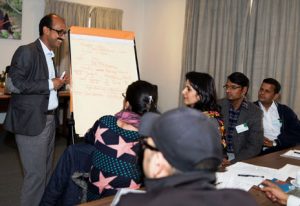This site uses cookies, as explained in our terms of use. If you consent, please close this message and continue to use this site.

Experts from the International Centre for Integrated Mountain Development (ICIMOD) and the Government of Nepal came together to brainstorm on the prospects and challenges in developing a mobile-based crop advisory system in Nepal on 12 March 2015. Participants included representatives of the Ministry of Agricultural Development (MoAD), Planning Commission, Department of Hydrology and Meteorology, Agricultural Environment Research Division, World Food Programme (WFP), and Kathmandu University (KU), as well as telecom operators and private sector. A representative from Reuters Market Light (RML), an Indian company that has pioneered a similar initiative in India on a larger scale, also attended the workshop.
Speaking at the opening session, Dr David Molden, ICIMOD’s Director General, said, “Over 70 percent of the total population of Nepal is involved in agriculture. Delivering essential information to farmers in time can help reduce the impact of the rapidly changing climatic conditions on their farmlands.” Highlighting the importance of early warning system in the event of disaster, Dinesh Prasad Parajuli, Joint Secretary of MoAD, talked about the after effects of cyclone Hudhud in Surkhet district in western Nepal in October 2014. He said, “The place experienced extreme weather conditions such as snowfall in spring time. Livestock were seen eating their own faeces.” He said that an early warning system could save farmers from incurring crop losses and other damages in the face of such disaster.
The crop advisory system aims to work as a two-way system that delivers crucial information to farmers as well as receives information from them, which can then be shared with concerned stakeholders.
The workshop focused on three key issues related to developing a mobile-based crop advisory system in Nepal: possibilities and challenges of integrating the new system into existing systems; content required by users; and supporting technologies. The mobile-based crop advisory system can generate information on weather forecast, crop season, best farming practices, local crops, agricultural market prices and arrivals, availability of fertilizers, electricity timings, early warning systems on disasters, training opportunities, government schemes, plant and veterinary disease prevention, and financing and insurance services. Such information can help farmers make timely decisions regarding their land and crops.
The drought monitoring system that is being developed by ICIMOD under the SERVIR-Himalaya initiative will provide long-term and short-term information on drought events. The mobile based crop advisory system can take this monitoring system to the local level with the integration of ICT tools.
At the closing session, Dr Eklabya Shrama, ICIMOD’s Director of Programme Operations, stressed the role of information in the changing cropping systems. He said that the advisory system needs to be context-specific and should address the specificities brought by change in altitude and latitude. Birendra Bajracharya, ICIMOD’s Regional Programme Manager for Mountain Environment Regional Information System (MENRIS), mentioned how the SERVIR programme uses satellite imageries to support decision making.
The brainstorming workshop was jointly organized by MOAD, WFP – Nepal and ICIMOD.
Stay up to date on what’s happening around the HKH with our most recent publications and find out how you can help by subscribing to our mailing list.
Sign Up